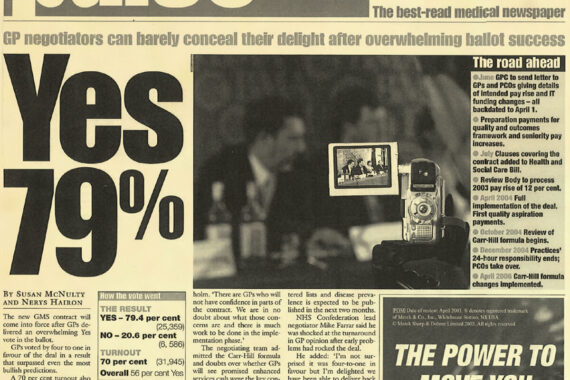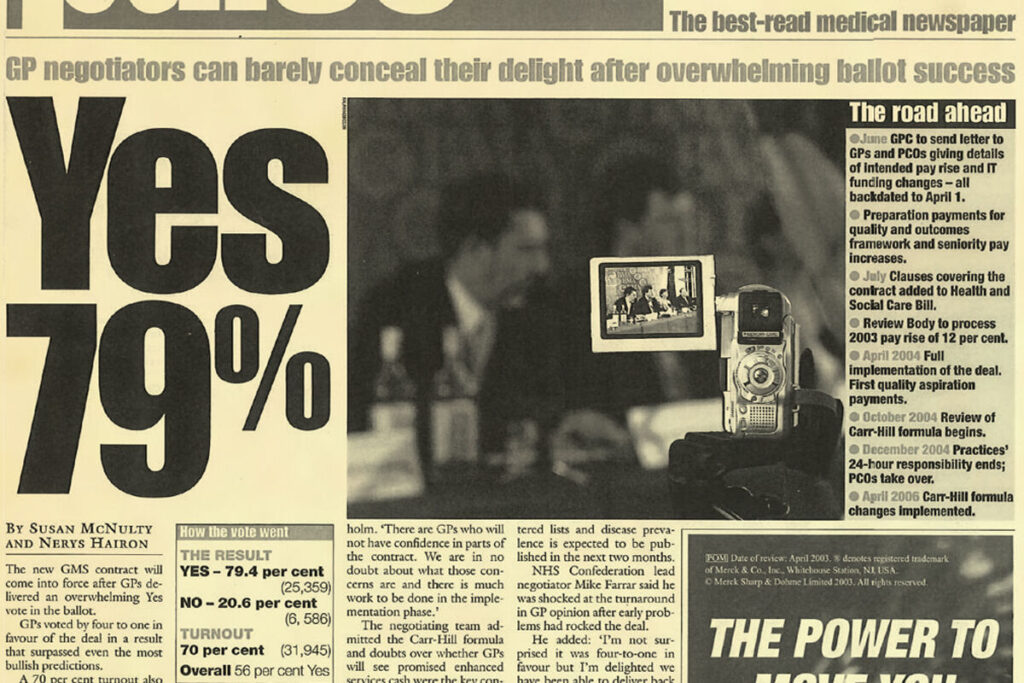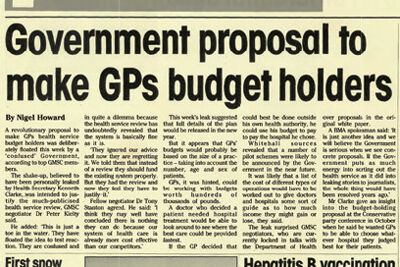Pulse in Print: How we got to the current contract


As part of the Pulse in Print series, we take a trip down memory lane to see how we got to the current GP contract

‘Pulse was first to realise how disadvantageous the new contract was to many GPs and because the BMA negotiators initially rubbished this, we ran a big campaign which culminated in MPIG so no GPs lost out and, in fact, then ended up with an enormous pay and pension rise.’
Dr Alistair Moulds, Pulse clinical adviser, 1983-2008
Twenty years on, the 2004 contract and negotiations still dominate the profession in all four countries. The contract overhauled the profession. It introduced the QOF, the Carr-Hill Formula and MPIG among other initiatives.
In the early 2000s, the profession hadn’t fully recovered from Ken Clarke’s contract imposition of 1990, which brought an emphasis on capitation payments away from a focus on premises and staff costs.
The 1990 contract also brought in GP fundholding. There aren’t too many Government schemes that have split the profession like GP fundholding. GPs who volunteered to be part of the scheme were given budgets to cover the costs of some secondary care services, prescriptions, and non-clinical practice staff. They were allowed to spend any savings they made. The BMA called on practices to boycott the scheme, while there were calls that fundholding GPs should not be allowed to hold LMC roles.

When Labour came into power, it began to wind down the scheme and fully abolished it in 1999 (although it retained the concept of commissioning, which was a consequence of fundholding, and GPs’ role in commissioning through PCTs).
Regardless of this, the mood in the profession at the turn of the millennium was not good. There was talk of industrial action.
So it might come as a surprise that the highlight of the 2004 contract wasn’t demanded by GPs, but was actually led by Tony Blair. In 2000, Blair wanted to tackle what he saw the poor provision of care by the commercial groups that practices employed to provide out-of-hours care. In a review of out-of-hours care that year, one of the main recommendations was a contract change for GPs to devolve care to accredited organisations – and importantly local commissioners would be accountable for these services. NHS Direct, and not GP practices, would become the first point of contact.
At the time, it wasn’t unanimously welcomed by GPs. Then GPC negotiator Dr Laurence Buckman – who later became GPC chair – said it would lead to ‘cheap and nasty’ out-of-hours services.
Three years later, the mood had changed. Following a ballot of the profession on the new contract, GPC leaders ‘barely concealing their delight’ at the 80% vote in favour, Pulse’s splash said. Earlier that year it looked as though ‘a No vote of even greater proportions seemed the only possible outcome’ as a result of the Carr Hill Formula cutting many practices’ income, a Pulse editorial said. The turnaround came about due to the introduction of MPIG. There might have been an ulterior motive for Pulse making this claim (see quote, above).
But although the removal of OOH responsibility was an undoubted positive for the profession, the success of the negotiations for GPs has proved problematic since, with successive governments cutting funding in real terms and imposing contracts on a consistent basis. This isn’t a conspiracy theory – in 2015, then health secretary Jeremy Hunt said: ‘Labour signed a disastrous contract in 2003 and since then, in penance really, the NHS has not really wanted to put extra money into general practice and it been has starved of resources progressively, with increases in hospital doctors but not increases in primary care doctors.’

We are long overdue a major overhaul to the GP contract in England to follow those in 1990 and 2004. We expect negotiations over the next few years. GPs will hope that they are no longer paying ‘penance’ for the crime of no longer having to work 24/7.
Pulse July survey
Take our July 2025 survey to potentially win £1.000 worth of tokens

Related Articles
READERS' COMMENTS [1]
Please note, only GPs are permitted to add comments to articles











Wasn’t 2004 the contract where there was a lot of feeling against it, and the question polled was ‘should we continue negotiating it?’, to which a vast majority thought it was really bad, and totally unacceptable, so voted ‘yes’ to continuing to negotiate it to a better one; and this somehow got turned around into ‘yes-we like it just like it is’, which i could never understand!